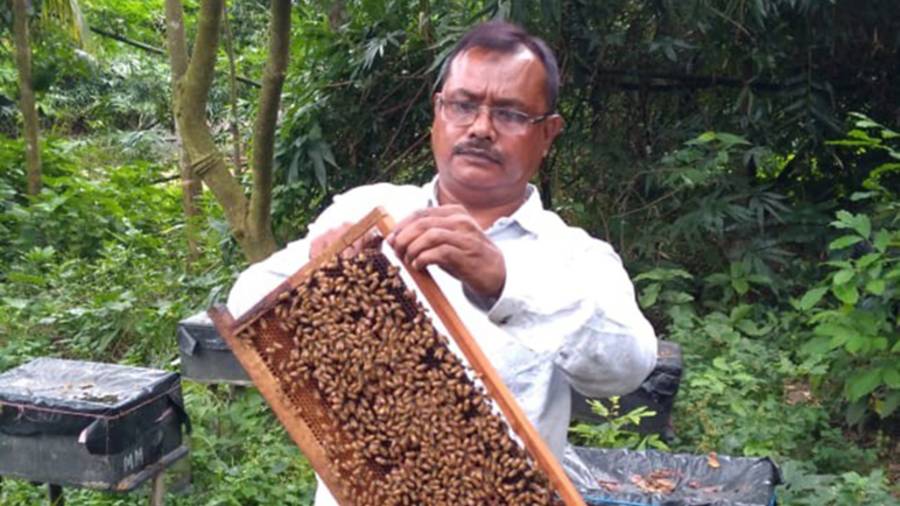Shah Rukh Khan will tell you, if a jingle by the state tourism department on YouTube is any indication, that Bengal is the sweetest part of India. But which is the sweetest spot in Bengal?
The query may make Mr Khan break out into his famous stutter.
The question, however, would have amused Mr Holmes. For Sherlock, who, we are told, spends his time these days raising bees in the south of England, must have surely heard the buzz — never mind the distance — in Madhugram. This tiny corner in Bengal can be reached, courtesy the Bongaon local, via Machhalandapur. Four kilometres from Machhalandapur lies West Chandipur alias Madhugram — the sweetest part of Bengal.
It is in this village that Harun Mondal makes a living, rearing his boxes containing, what he calls, “khudoler maachi” — the Apis mellifera — also known as the western honey bee, which is commonly found in Europe, the Middle East and Africa. So how did the Apis mellifera find its way to Madhugram? Let Harun take over from here.
“In the 1980s, I used to earn my living, much like the rest of the villagers of Chandipur, by selling vegetables. I was in Asansol one day when I saw on television a programme that encouraged people to take up bee-keeping. It piqued my interest. So much so that I got a few boxes made in Baruipur and started my life as a bee-keeper.” But life, as it often does, stung Harun badly.
“My first attempt as a bee farmer ended in disaster. Most of the bees perished — the larvae died — because of an ailment that I had no knowledge of. Then in 1990, I travelled to Ludhiana in Punjab and bought five boxes of bees. They thrived and seven years later, I had nearly 500 such boxes producing, on an average, 100 tonnes of honey every month.”
Slowly, Madhugram took shape. “When I started off, I was the only bee-rearer,” said Harun. “But bees now provide an alternative livelihood to at least 125 families in my village.”
The whiff of sweetness has also drawn respectable clients. Harun listed some of them. “The honey season lasts from the month of Kartik to the month of Joishtho. Dabur buys our honey. As does another big firm in Punjab. These companies buy our honey after strict quality assessment. Representatives come here to collect samples. They are then tested in laboratories. I often travel to Delhi to discuss pricing, stock and other issues.”
Nadia, Midnapore, Bankura and Malda are also dotted with small buyers. But it isn’t only honey that Apis mellifera is famous for. The bees have another crucial — environmental — role. “I often travel with my bees to Malda that has mango orchards. Or to other districts that grow fruits like lychee and crops like mustard. The bees are in great demand among farmers there because they function as pollinators.”
Soon, the Apis mellifera could play a pivotal role in dousing the fire of man-animal conflict. At least Shyamal Kumar Ghosh, the secretary of People’s Green Society, a philanthropic organisation, thinks so. “We are planning to encourage people of the Sunderbans to embrace bee-keeping. The money generated would serve as a supplementary income and reduce their dependence on the forest. This, in turn, can bring down the number of human fatalities at the hands of tigers. We plan to begin our pilot project in Jharkhali,” said Ghosh.
The trail of blood in the isles has thickened this year. Official estimates — they are never quite reliable — suggest that as many as 15 people have been killed by tigers this year till early September. The figure, at the time, was already higher than the number of casualties for the whole of last year. These incursions into the forests signal a deepening joblessness in Bengal’s hinterland. The return of migrants, who had lost their jobs in other states, has also put additional pressure on welfare schemes such as the MGNREGA in the Sunderbans.
Harun, too, is struggling to survive. “The sudden lockdown dealt a body blow to Bengal’s bee-keepers who had not yet recovered completely from notebandi (demonetisation) that had crippled the circulation of currency.”
The path to a semblance of recovery, he believes, for Bengal’s bee-keepers and their families, would depend on the government taking the following steps: apiaries should come under effective insurance policies that can guard them against natural calamities; soft loans must be extended to bee farmers; each bee-keeper should be provided bona fide identity cards. “That should stop policemen from demanding a share of the little money we earn by ferrying honey.”
Honey, evidently, has many takers. But not all of them have clean hands — some of India’s leading honey brands have been accused of adulteration by the Centre for Science and Environment.
Now that would have enraged Sherlock Holmes.







